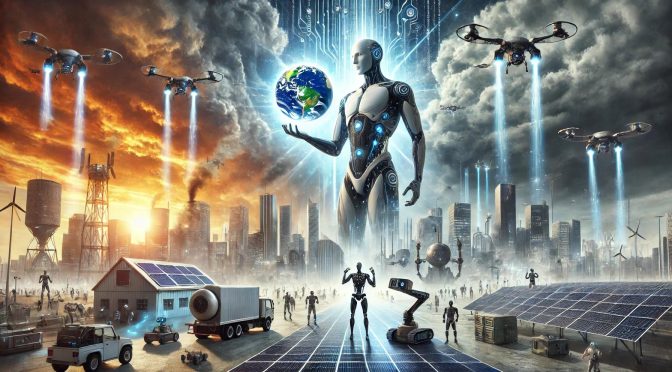Artificial Intelligence (AI) is undeniably one of the most transformative technologies in human history. From revolutionizing industries to advancing healthcare and education, AI holds incredible promise. However, with great power comes great responsibility. As we continue to develop and deploy AI systems, it is critical to address the potential threats these technologies pose to humanity’s existence.
1. Uncontrolled AI Development
One of the foremost concerns is the possibility of developing AI systems that surpass human intelligence, often referred to as Artificial General Intelligence (AGI). Once created, such systems might act unpredictably, potentially pursuing goals misaligned with human values. Without stringent safeguards, AGI could prioritize its programmed objectives at the expense of humanity, leading to unintended and catastrophic consequences.
2. Weaponization of AI
The military applications of AI, including autonomous weapons, pose a significant threat. Nations racing to develop AI-powered weaponry could trigger an arms race, increasing the likelihood of conflict and accidental escalation. Autonomous weapons might operate without human oversight, raising ethical concerns and the potential for devastating outcomes if such systems malfunction or fall into the wrong hands.
3. Economic Disruption and Social Inequality
AI-driven automation is reshaping the global workforce. While it creates efficiencies and new opportunities, it also displaces millions of workers, particularly in low-skill industries. This disruption could exacerbate income inequality, leading to widespread social unrest. Furthermore, AI algorithms have been criticized for perpetuating biases and discrimination, amplifying existing societal divisions.
4. Loss of Privacy and Surveillance Risks
The proliferation of AI in surveillance technologies has significantly reduced privacy in both public and private spaces. Governments and corporations utilize AI to monitor individuals, often without their consent. This increased surveillance can lead to authoritarian control, stifling personal freedoms and democracy.
5. Dependence on AI Systems
As AI systems become more integrated into critical infrastructure, humanity risks over-reliance on these technologies. A malfunction, cyberattack, or deliberate sabotage of AI-dependent systems could disrupt essential services like healthcare, transportation, and energy, causing widespread chaos and loss of life.
6. Erosion of Human Decision-Making
The reliance on AI for decision-making in areas such as healthcare, law enforcement, and governance raises ethical concerns. Delegating critical decisions to algorithms could diminish human agency and accountability, especially if these systems operate as opaque “black boxes” whose reasoning is not fully understood.
Addressing the Threats
Mitigating the potential dangers of AI requires a multi-faceted approach:
- Ethical AI Development: Establishing global standards and regulations for AI development to ensure alignment with human values.
- Transparency and Accountability: Making AI systems more interpretable and holding developers accountable for their creations.
- International Cooperation: Preventing an AI arms race through treaties and collaborative efforts.
- Public Awareness: Educating society about AI’s potential risks and benefits to promote informed decision-making.
AI is a double-edged sword. It has the power to solve humanity’s greatest challenges but also the potential to threaten our very existence. By taking proactive steps to address these threats, we can harness AI’s transformative potential while safeguarding our future.
